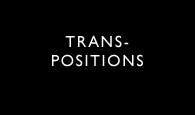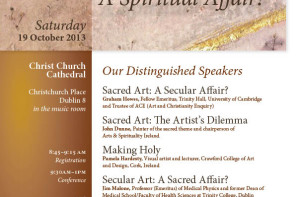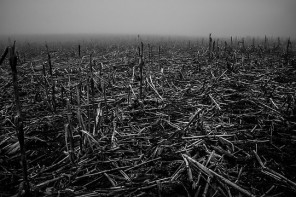The Revd Dr Robert MacSwain, a St Andrews alum, alerts us to two sessions at this year’s American Academy of Religion/Society of Biblical Literature conference in Baltimore, Maryland, November 2013, that are relevant to Transpositions readers:
1) “‘A New Way of Doing Theology’: David Brown and the Practices of Art and Faith”, sponsored by the Christian Systematic Theology Section
Abstract: Between 1999 and 2008, David Brown (Institute for Theology, Imagination, and the Arts, University of St. Andrews) published five major volumes with Oxford University Press: Tradition and Imagination, Discipleship and Imagination, God and Enchantment of Place, God and Grace of Body, and God and Mystery in Words. According to Brown, these volumes proposed “a new way of doing theology,” in which “religious practice [is] fully integrated into consideration of the more academic issues.” They also defended a radically sacramental vision in which divine generosity graciously pervades the various practices of human art, culture, and religion—not just Christianity. In 2012, Oxford University Press published Theology, Aesthetics, and Culture: Responses to the Work of David Brown. This panel session will engage both directly with Brown’s work and with the responses of his various interlocutors, exploring the extent to which the arts may be construed as practices of the Christian life.
Monday, November 25, 4:00-6:30 PM (Location TBA)
Presider: Ellen T. Charry (Princeton Theological Seminary)
Panel:
Jolyon Mitchell (University of Edinburgh)—“Visual Art and Media”
Lizette Larson-Miller (General Theological Union)—“Liturgy and Sacraments”
Steven Guthrie (Belmont University)—“Songs and Music”
George Pattison (University of Glasgow)—“Poetry and Drama” [N.B. Professor Pattison is moving from Oxford to Glasgow in October]
Response: David Brown (University of St. Andrews)
2) “Reflections on the Fiftieth Anniversary of the Death of C. S. Lewis”, sponsored by the Arts, Literature, and Religion Section
Abstract: C. S. Lewis (1898–1963) is both a phenomenon and an anomaly. He is a phenomenon in that, fifty years after his death, he remains one of the world’s most popular authors; and not just in one genre, but several. Lewis is also an anomaly in that, while he has retained a vast and loyal readership, especially among American evangelicals, scholars are sharply divided over the value and significance of his work. This is particularly true in theology and religious studies, but also in literature as well. Thus, in the fiftieth anniversary of his death, the Arts, Literature, and Religion Section is providing an interdisciplinary session on this complex, influential, controversial, but still comparatively neglected figure.
Tuesday, November 26, 9:00-11:30 AM (Location TBA)
Presider: Robert MacSwain (University of the South)
Panel:
Wesley A. Kort (Duke University)—“Reassessing C. S. Lewis”
Robert Song (Durham University)—“The Abolition of Humanity?: C. S. Lewis and a Post-Human Future”
William J. Abraham (Southern Methodist University)—“The Christian Apologist: From Philosophy to Fairy Tales”
Douglas Hedley (University of Cambridge)—“C. S. Lewis and the Living Imagination”
Response: Stephanie Paulsell (Harvard Divinity School)
Please comment below if you are planning to attend either of these sections, so that Transpositions readers can connect at the conference!




